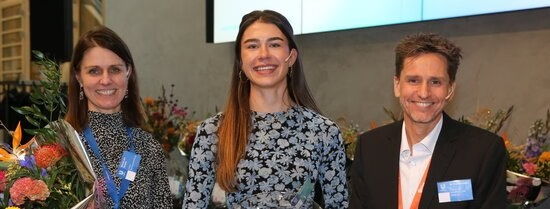For decades, universities worldwide have been struggling with persistent gender inequalities in study choices, especially in engineering and social sciences. Despite numerous initiatives, progress towards gender equality remains limited, and the underrepresentation of women in engineering poses both an economic and social challenge. Maika Kielman, a student of Educational Sciences at Erasmus University Rotterdam, investigated for her thesis whether students' creative self-confidence (CSE) plays a role in their choice of study programme and whether their gender plays a role in this. It has become clear that creative self-confidence (CSE) provides a key mechanism for overcoming this inequality. She revealed that students with greater confidence in their creative abilities are more inclined to choose technology, and this applies to both men and women. On 27 November, she received the Unilever Research Prize 2025 for her thesis.
Despite decades of initiatives, women remain less inclined to pursue technical education (STEM), which limits both their economic opportunities and the diversity of perspectives in innovation-driven sectors. A more equal gender distribution in higher education can stimulate global economic growth, increase productivity, and alleviate labour shortages in critical sectors such as technology, healthcare, and education. Maika Kielman explored this issue of gender imbalance in education in her thesis. She investigated whether students' creative self-confidence (CSE)—their belief in their ability to think creatively and solve problems—plays a role in their choice of study programme, and whether gender moderates this relationship.
Higher creative self-confidence plays a role in choosing a technical field of study
For her research, Maika Kielman analysed data from 1,728 German university students (in both engineering and social sciences), collected as part of the large-scale “Fachkraft 2030” survey project. Her findings show that students with higher creative self-confidence are significantly more likely to choose engineering than social sciences. Importantly, this relationship was consistent across genders: higher CSE increases the likelihood of choosing technology for both men and women. Although men still have a higher overall likelihood of studying technology, the results show that when students—regardless of gender—have more confidence in their creative abilities, they are more likely to choose technical programmes.
Gender-inclusive path to change
These findings have far-reaching practical implications. For example, schools and universities can encourage more diverse groups of students—particularly women—to consider technical education. Rather than focusing exclusively on structural barriers, it identifies a psychological lever that can be strengthened through targeted interventions in schools, universities, and policy programmes.
For example, schools and universities can encourage more diverse groups of students—especially women—to consider technical paths by designing interventions that increase students' creative self-confidence. Furthermore, educational institutions can reshape perceptions of engineering as a creative and innovative field by reducing teacher bias, for example, a teacher who unconsciously encourages boys to choose a robotics assignment, while girls are more likely to be referred to creative or social projects. In addition, educational institutions can make curricula more inclusive and invest in creativity-enhancing interventions.
Thesis supervisor Dr Kim van Broekhoven: "I am proud that Maika Kielman has been awarded the Unilever Research Prize, which is well deserved! She demonstrated an exceptional level of academic maturity and dedication. She independently managed a complex project involving a remarkably large dataset of more than 1,700 students, learning and applying new advanced statistical techniques with precision and clarity. In addition to her academic excellence, she brings a strong sense of collaboration and purpose to her work. She thrives when working with others and is energised by seeing results applied in practice.”
Maika Kielman completed the Master's programme in Educational Sciences at the Erasmus School of Social and Behavioural Sciences, where she graduated with honours under the supervision of Dr Kim van Broekhoven. Thesis title: Higher Creative Self-Efficacy Stimulates the Choice for Engineering in Both Men and Women.
About the Unilever Research Prize
Unilever Research Prize 2025 rewards young top scientists whose research makes a positive contribution to solving some of the world's most pressing problems. The annual award ceremony is an important event for Unilever and strengthens their relationship with science. The initiative for the Unilever Research Awards dates back to 1956 and took place for the 68th time this year.
- More information
Marjolein Kooistra, communications ESSB, 0683676038, kooistra@essb.eur.nl
- Related education

